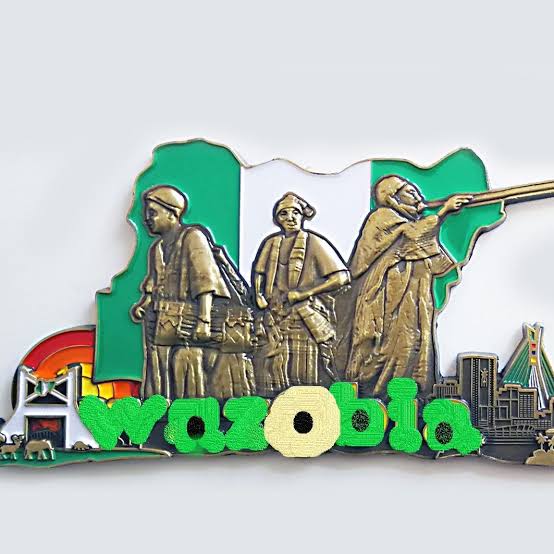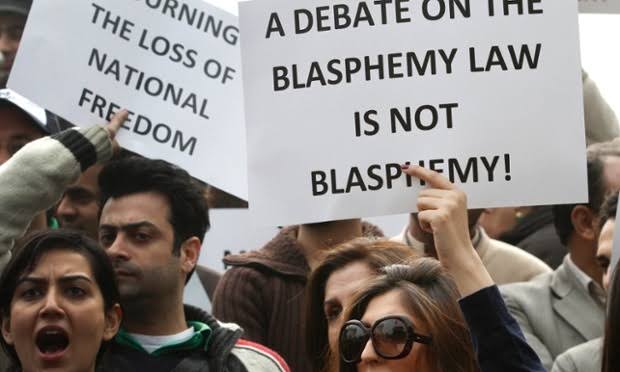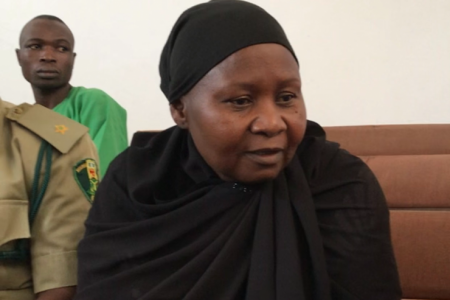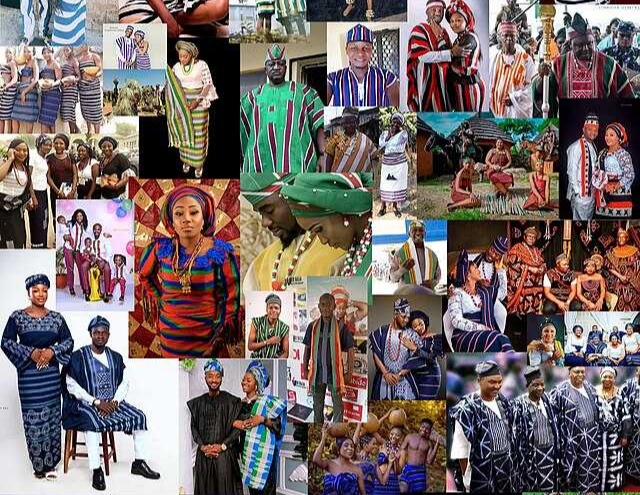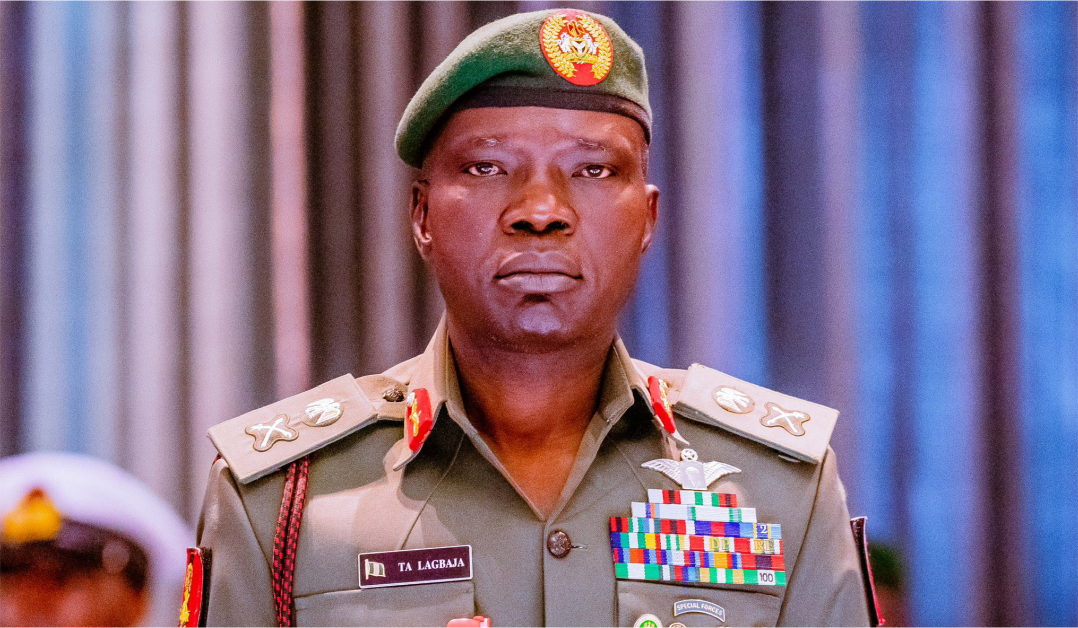The Wazobia Trifecta and the Rest of the Citizens: Is One Nigeria a Myth?
By
Helene Alade
&
Terna Akambe NENGE
revnengeterna@gmail.com
ABSTRACT
One Nigeria is a myth! This conclusion is drawn from the various failed attempts at national integration. Being a product of colonial fiat, Nigeria is an amalgam of over 300 ethnic groups that live largely for the pursuit of their ethnic interests at the expense of the numerically disadvantaged ethnicities. The framers of the constitution bequeathed a document that is so much lope-sided with its winner-takes-all enormous powers arrogated to a single person – the president, who decides who gets what. Policies like the Quota System or Federal Character and Wazobia could be best described as charade that was used as façade for the feudalistic tendencies of the wazobia trifecta – Yoruba, Hausa-Fulani and Igbo – the so-called majority ethnicities. Using exploratory, analytical and phenomenological methods, the paper argues that the quota system is only used to benefit the core north in areas of education and civil service where they come short on merit. They deny federal character when it comes to who becomes the president; they take advantage of their numbers. These ethnic groups are the cause of national disharmony with their ethnic chauvinism. The paper concludes that until the trifecta work towards using their numbers in favour of the rest of us – the minorities, one Nigeria will be impossible. It is recommended that to have national integration, every ethnic group must be given the opportunity at the presidency, a new constitution drafted and ratified through a referendum and religion should not be used as a means for the attainment of selfish ethnic goals.
Keywords: Wazobia trifecta, National integration, Religion, Ethnic chauvinism, Nigeria
INTRODUCTION
Nigeria is a mix of cultures and religions. Instead of this multivalence to be its impetus for national integration and development, it has turned out to be its undoing. Its abundant natural wealth unequally yoked with a rent seeking, feeding bottle economy in a system of government that the winner of the election takes all, the country has been rife with strife that has always ended up in bitter ethno-religious carnage that leads to colossal loss of lives and properties.
While some Nigerians strongly believe in ‘one ‘Nigeria,’ at least in theory, practically it seems to be a myth.
According to Otedo News, the name WAZOBIA was given by the late musician, Roy Chicago. The concept behind this acronym, was to enable the translation of news in the three major languages namely Yoruba, Hausa and Igbo from which dialects the word “come” was used for the coinage hence “wa,” “zo,” “bia,” are Yoruba, Hausa and Igbo respectively. In the light of this development, Otedo News further pointed out that by picking only these three ethnic groups, called in this paper “the wazobia trifecta,” the country discriminated against the other ethnic groups:
And then Nigeria embarked on radio and television translation of news in what they called the three major languages, and sent all the other languages into the cooler, for them to groan and get lost, as if the country did not belong to them as well. This single action is what has led the country into its present doom of the “Federal Character syndrome,” (you must come from any of those three major languages and ethnic groups) to be heard, recognized and given reasonable political appointment no matter your talent and accredited professionalism.
The above quote serves this paper like a sniper’s rifle lens from which to see the vista of our thesis namely that the wazobia trifecta is a gross form of injustice that is meted out to the other very many ethnic groups in the country. The Federal Character is designed to serve the needs of the trifecta while the others groan. While this is concerning, it is even more worrying that even within the trifecta there has always been a raging supremacy battle that has distressed and disunited the country over the years thereby making the notion of one Nigeria a mere myth. It is safe to say that national integration will remain a cerebral infrastructure or concept that may not be realized anytime soon as indices show.
CONTEXTUAL FRAMEWORK
Wazobia trifecta: The term trifecta has many shades of meanings but the one in line with the aim of this paper is that which defines it “as a set of three related things, often things that cause problems.” In the context of this paper, wazobia is a representative coinage for the three so-called major ethnic groups in Nigeria namely Yoruba, Hausa/Fulani and Igbo. Needless to say that they are the cause of Nigeria’s problems that has made national integration seemingly unattainable.
One Nigeria: One Nigeria is a concept that hopes for national unity, cohesion, harmony and integration. Being a country of over 350 ethnic groups, it is only natural that the citizens hope for unity and national integration for progress, development and prosperity. This is significant and of colossal magnitude especially given the fact the all these ethnic groups were amalgamated by a colonial fiat for ease of imperial governance. This means that Nigeria was conceived and birthed in selfish circumstances hence the need for oneness and togetherness. But can the rogue activities of the wazobia trifecta yield one Nigeria?
The rest of the Citizens: This is a representation of the minority ethnic groups. Of the more than 350, when the trifecta is subtracted, then the rest of us is what remains. Accordingly, wherever this phrase is used in the paper, it means the minority groups and wherever the trifecta is used, it means the majority groups. How do the activities of the trifecta affect the rest of us? Is there any possibility for one Nigeria, as a consequence of these activities and how can national integration be achieved?
OBJECTIVES
The objective of this paper is to:
- Interrogate if “one Nigeria” or national integration is a myth based on the activities of the trifecta.
- To ascertain the level of disintegration in Nigeria as it concerns ethnicities.
- To proffer solutions for national cohesion, harmony and integration.
LITERATURE REVIEW
Tess Onwueme, a Nigerian playwright, uses wazobia as a personification, or the protagonist character, in one of her plays titled ‘Wazobia.’ Wazobia was nonconformist to her community customs that she feels engender injustice against her female gender and became the voice of the voiceless in the process. While this character in the play symbolizes what the concept of wazobia could have been, it is pertinent to state that the contrary is the case. Rather than serve as the centre of gravity to pull other ethnicities together for justice and equity, the trifecta has been in the front burner of injustice and annexation of other minority ethnic groups within their catchment areas.
Agbajileke pointed this out in his article “Losing our identities to major ethnic groups in Nigeria” when he argued that the wazobia trifecta has succeeded in subsuming other ethnic groups under their hegemony. For example, in the south-south, the Urhobo, Isoko, Edo/Bini, among others are culturally subsumed under the Yoruba ethnic group as many of them bear Yoruba names. In the Middle Belt, efforts are still on for the religious and political annexation of the very many ethnic groups here under the Hausa/Fulani hegemony. One of the authors, as a Tiv man, traveled to Adamawa state few years ago, upon introducing himself, his host immediately called him the ethnic slur “nyamiri,” a derogatory reference to the Igbo ethnic group. While in the East, he was called “onye Hausa.” This points to the fact that the Middle Beltan and other minority peoples are fast losing their ethnic identities to the wazobia trifecta.
Kalu argued that in Africa, especially Nigeria, people tend to pay allegiance to their ethnic group rather than the country and this has succeeded in eroding or depriving the country of national integration or cohesion even as political parties are formed based on ethnic ideologies. Nigeria is known for its notorious gravitation towards ethnic and religious cleavages, the trifecta exploit this for their advantages. Whenever an election cycle comes in, it is common to hear them argue that this time Nigeria must produce a president of “Igbo, Hausa/Fulani or Yoruba extraction.” Nobody seems to argue for a “Nigerian president.”
For example, the 2023 presidential election, all the aspirants were members of the trifecta – Yoruba (wa), Hausa/Fulani (zo) and Igbo (bia). The minorities are always at the receiving end of the activities of the wazobia trifecta and because, the rest of the citizens are subsumed under their hegemony, it is difficult for us to be heard. Our voices are drowned amid the raucous clamour of the three. When will someone from the rest of us become the president of Nigeria based on merit and the fact of national integration and not a recourse to ethnic bullying?
The trifecta is also the problem of this country and the reason one Nigeria is a myth. Adamu and Ocheni disarmingly postulated that the struggle for recognition and survival the ethnic groups in Nigeria influenced by the fear of domination by another ethnic group is a threat to national unity, integration and peaceful coexistence. According to them, “ethnic virus has been a dangerous cancer causing social crisis, political instability and threat to peaceful coexistence, unity and national integration of Nigeria as a nation.”
This scenario had already been described and decried by Chinua Achebe in his book, There was a Country. Achebe pointed out the pettiness of the trifecta emphasizing the unprecedented rapidity in economic and educational attainment of the Igbo and Yoruba ethnic groups in the late 19th and early 20th centuries which led to their dominance in both the education ministry and civil service. This elicited uneasiness from the other majority ethnic group and what followed was lamentable:
The ply in the Nigerian context was simple and crude: Get the achievers out and replace them with less qualified individuals from the desired ethnic background so as to gain access to the resources of the state. This bizarre government strategy transformed the federal civil service, corporations, and universities into centers for ethnic bigotry and petty squabbles.
Achebe further expressed dismay when he stated ethnic persecution, hate and resentment was created and sanctioned by unscrupulous self-serving politicians resulted to terminations and dismissal of Nigerian citizens from civil service based on their ethnicity. According to him “in Nigeria it bred resentment and both subtle and overt attempts to dismantle the structures in place for meritocracy in favor of mediocrity, under the cloak of a need for “Federal Character” – a morally bankrupt and deeply corrupt…”
Achebe was right to describe the federal character as “morally bankrupt and deeply corrupt” because this has tended to favour only one of the trifecta – the Hausa/Fulani of the far north. Over the years, employment, appointments and admissions into federal government establishments and schools have clearly showcased this. For example, in this present Buhari’s administration, all the security heads are Fulanis or some far north indigenes at the expense of other ethnic groups.
Adegbami and Uche expressed the same sentiments when they asserted that despite the fact that Nigeria is a state of multiple nationalities it is “still be seen peripherally as a nation with tripodal ethnic structure with the trio of Yoruba, Hausa/Fulani and Igbo constituting a pole each in the unceasing struggle for political and economic resources of the nation. The existing cleavages… metamorphosed into a… hydra headed monster tormenting and straining the nation’s political developments” adding that “the alliances and coalitions between/among political parties to have overall majority needed to win election(s) are based on ethnic sentiments and ethnic gang-up.”
This is exactly what is happening concerning the presidential ticket of the All Progressives Congress (APC) where both the presidential, Bola Tinubu and the vice presidential, Shettima are both Muslims and from the trifecta. The same can be said of the Peoples Democratic Party (PDP) ticket on which Abubakar Atiku, a Fulani is running as the presidential candidate with Okowa, vice presidential candidate of Igbo extraction from the south. All these alliances do not take into cognizance the plight of the minorities who are only used as pawns to win a political chess game.
Nigeria is deeply enmeshed in the unfortunate dichotomy of otherliness – “them” and “us,” which find expression in “our own,” or “our time.” These sentiments have gone to extreme lengths in supporting mediocrity and corruption as long as the one perpetrating it belongs to “our ethnic group.” For example, during the Goodluck Jonathan administration, there were serious resentment that morphed into agitations, protests and strikes that were organized by the members of the trifecta against his politics especially concerning security and energy.
During his administration, fuel pump price was N65, subsidy was to be removed; about 200 Chibok secondary school girls were abducted by Boko Haram and other insecurity situations. National protests were organized some held at Ojota in Lagos led by Wole Soyinka, Tunde Bakare of Yoruba stock and others against fuel subsidy removal; at Abuja was the Bring Back Our Girls sit in protests that even attracted international ridicule of the Jonathan administration. This led to Jonathan losing his reelection bid in 2015 ushering in the Buhari administration.
Today, fuel pump price is over ₦600 naira; insecurity is rife as bandits and Boko Haram are terrorizing major cities, killing, sacking villages and kidnapping for ransom all over Nigeria. Herdsmen believed to be Fulani militia taking over ancestral farmlands in the North Central and other regions, Unknown gun men in the eastern part of the country; fuel subsidy is said to be removed, yet there is no single agitation or protest against these. The only explanation is that Muhammadu Buhari belongs to the trifecta while Jonathan was one of “the rest of us” – a minority.
Similarly, Umezinwa, in his deposition, tied Nigeria’s underdevelopment to a handful of factors, prominent among them is ethnicity. In the vista of his paper, he gravitates towards the conclusion that development will continue to be elusive to Nigeria because of the lack of cohesion, harmony and integration among the ethnic groups. This implies that the mantra of one Nigeria is a myth; as the unity that could have influenced its attainment is buried in the bottomless pit of sticky clay of ethnic strife orchestrated by the trifecta against the rest of us. He magisterially concluded, like others that this problem is caused by “the desire to dominate or the fear of being dominated by other ethnic groups.”
Rindap, writing from the perspective of the rest of the citizens – as a minority herself, asserted that even though the out-cry of the minorities concerning political, ethnic and economic marginalization by the trifecta had led to the creation of states and local government areas as a solution, the problem has continued to veer its head and remains till today. This is so because the trifecta has not relented in their efforts at dominating the polity and reaping everything for themselves. She contended that “at the vortex of the ethnic minority question is the disenchantment with the structure of the Nigerian federation perceived by the ethnic minorities to be skewed in favour of the three dominant ethnic groups by the three ethno-regional blocs: Hausa in the North, Yoruba in the West and the Igbo in the East. For the ethnic minorities, the federation is not inclusive and this results in political, economic and cultural marginalization.”
It is believed that the seed for this ethnic strife was sown in the first republic when political parties and regions were built around religions and leaders that were selfish and naïve. In the 1964 elections, three major regionally based and tribally sustained political parties came existence. The major competitors were the Northern People’s Congress (NPC), Hausa in the North, the Yoruba and Action Group Party (AG) in the West, and the National Convention of Nigerian Citizens (NCNC) and the Ibo in the East. There were also the virile but minority ethnic groups such as the Bini and Urhobo in the Mid –West, the Tiv and Idoma in the Middle Belt and others in the Calabar-Ogoja-Rivers (COR) area. (The main-stay of the NPC whose motive was the consolidation of Northern hegemony) .The United Progress Grand Alliance (UPGA) formed by the National Council for Nigeria and Cameroon (NCNC) and Action Group (AG), Northern Elements Progressive Union (NEPU), and the United Middle Belt Congress (UMBC) was to halt hegemony. This trend still continues today.
While the trifecta seek to dominate at the national level, at the states level, there are some ethnic groups that dominating others. Benue state is a classical example. The Tiv people have dominated other ethnic groups since the creation of the state in 1976. The office of the governor of the state rotates between the two senatorial districts of the Tiv people while the Idoma take the deputy. The Idoma in turn dominate the Igede ethnic group as the vicious cycle continues.
In the same vein, Emoghene and Okolie having conceded that Nigeria’s problem emanates from its multiple ethnic nationalities argued that “federalism is arguably the suitable framework for addressing ethnic, cultural and religious pluralism in a complex society like Nigeria. In such system, each region or state is allowed to control its resources and develop at its own pace. However, Nigeria who claims to run a federal system of government operates the opposite and does not recognize the identities, interest and needs of the people especially the minorities. The nation’s constitution does not reflect the wishes of the people; most government policies are anti-people and do not engender national integration and cohesion.”
METHODOLOGY
This paper adopted exploratory and analytical method. The authors explored extant literature that included online journals, newspaper articles, news bulletins, campaign releases among others. The choice of these methods is because the area of study for the paper is still a progressive one and because they best describe the existential realities of the people for their lived experiences, the authors inclusive. Personal experiences and observations of the authors were also put into use.
FINDINGS
Findings show that Nigeria has a problem. This problem is lack of national integration. And this problem is largely perpetuated by the wazobia trifecta. The trifecta is afraid being dominated by one of them. This fear has made them employ and deploy all sorts of tactics to stay in power and control the rest of the ethnic groups. Other ethnic minorities are subsumed under some of them. The example of Edo people bearing Yoruba names and even living the Yoruba culture, comes to heart. In the so-called North Central region, many of the ethnic minorities have even lost their identities. People from other regions think that Tiv, Nupe, Berom, Igala, Ebira among others are all Hausa tribes and all Muslims.
The unbridled desire of the trifecta to always have access to and control national resources, they threateningly make alliances among themselves to a point that could be described as a gang-up. They brag about their numbers. For now, it is obvious that in the All Progressives Congress (APC), the Yoruba have allied with the North in order to secure votes to win the presidential elections. That is why their ticket is even religiously insensitive as their presidential and vice presidential candidates are all Muslims. The calculations are that because Bola Tinubu is from the West – Yoruba and Kashim Shettima is a northern Muslim, they are sure to get the numbers to win their election. Abubakar Atiku, who is a Fulani man just like Muhammadu Buhari, wants to succeed Buhari even though they are from the same ethnic group. How can there be national integration when this type of unmindful and total disregard to other ethnic groups is perpetrated?
The quota system is another way of legalizing selfishness and entrenching hatred, resentment and national disintegration. The north uses it every time to manipulate and cheat other ethnic group, confirming magisterially that Nigeria is built on the foundation of malfeasance. When it comes to political power, like the president, the north brags about their numbers and employ every subtlety to win. They tell everyone that it is all about competence and not religion or ethnic group, but when it is employment or admission into federal colleges or establishments, they invoke federal character or quota system.
No doubt, this has caused resentment and hatred among Nigerians and the divisions are becoming wider and wider by the day. Interactions among Nigerians are filled with angst, anger and indescribable hatred. Ethnic and religious slurs are directed at one another in a way that betrays deep rooted hatred for each other. The trifecta cares little about the harmonious coexistence of Nigerians because they benefit from the divisions. They get to power through pitching Nigerians against themselves and this is why one Nigeria will continue to be a myth. It will continue to be a concept and an ideology the trifecta will continue to reference when they want to exploit the rest of us to satisfy their lust for power.
RECOMMENDATIONS/SUGGESTIONS
All said, this paper makes the following recommendations/suggestions:
- Given that the colonialists brought Nigerians together without their say so and since then there not been national unity, it will serve the country better if a referendum is held to decide how this country will move forward. A referendum will set the parameters and define rule by rule and line by line how we are going to live together in this country. The present constitution is not people oriented but designed to benefit some tribes among the trifecta at the expense of the rest of us. A referendum should produce a constitution enacted by the people’s representatives.
- The present system of government, the so-called federal system of government in which the winner of election, especially the president, takes all and given maximum powers to a point of being like a god, should be discarded for ethnic federalism. By ethnic federalism, ethnic groups will be autonomous and will control the resources within their borders and pay corresponding taxes to the government at the national level. If this is implemented, it is our belief that religious and ethnic strife will be history.
- Power should reside with the people not a chosen few who hang on to it and manipulate their ways to continue to milk the country’s resources for their personal aggrandizement. If this happens, citizens will learn to be patriotic. It will not be about “us” against “them” but “us” for “us.” Every one of us will see Nigeria as our project, our country and not from the selfish perspective of it is our time, Tinubu’s emi l‘okan.
- The quota system or federal character should be abolished. This is used for the benefit of only the north, a policy that is carried out due to the fear of the north being dominated by other ethnic groups.
BIBLIOGRAPHY
Achebe, Chinua (2012) There was a Country: A Personal History of Biafra. London: Penguin
Books Ltd.
Adamu, Abdulrahman and Ocheni, Danladi. “Ethnic Politics and the Challenges of
National Integration in Nigeria.” International Journal of Politics and Good Governance Volume VII, No. 7.2 Quarter II 2016 ISSN: 0976 – 1195, 2016
Adegbami, Adeleke and Uche, Charles I. N. “Ethnicity and Ethnic Politics: An
Impediment to Political Development in Nigeria.” Public Administration Research journal, Vol. 4, No. 1 (2015) (https://ccsenet.org/journal/index.php /par/issue/view/1202, DOI:10.5539/par.v4n1p59 (https://doi.org/10.5539/par.v4n1p59)
Adetiba, Toyin Cotties and Rahim, Aminur. “Between ethnicity, nationality and
development in Nigeria.” International Journal of Development and Sustainability Online ISSN: 2186-8662 – www.isdsnet.com/ijds Volume 1 Number 3 (2012): 656-674 ISDS Article ID: IJDS12092603
Agbajileke, Owede. “Losing our identities to major ethnic groups in Nigeria.” thecable.ng, 2022
Diamond, Larry. Class, Ethnicity and Democracy in Nigeria: The Failure of the First
Republic. Houndmills: The Macmillan Press LTD, 1988
Emoghene, Aghogho Kelvin and Okolie, Ugo Chuks. “Ethnicity, Religion, Politics and the
Challenges of National Development in Nigeria.” Journal of Public Administration, Finance and Law, Issue 18/2020
Kalu, Peters. “Political Parties and Ethnic Politics in Nigeria.” NG-Journal of Social
Development, Vol. 5, No. 2, January 2016, www.arabianjbmr.com/NGJSD_index.php
Otedo News “Origin of WAZOBIA as Majority Language in Nigeria.” Radio Oseghe
Edo, otedo.com, 2009
Rindap, Manko Rose. “Ethnic Minorities and the Nigerian State.” An International
Journal of Arts and Humanities (IJAH) Bahir Dar, Ethiopia Vol. 3 (3), S/No 11, July, 2014: 89-101 DOI: http://dx.doi.org/10.4314/ijah.v3i3.8
Umezinwa, Cletus. “Ethnicity and Nigeria’s Underdevelopment.”
http://dx.doi.org/10.4314/og.v9i1.11
Worugji, GE. “Redefinition of the Position of Women in Osonye Tess Onwueme’s Play
“the Reign of Wazobia.” Lwati: A Journal of Contemporary Research, Vol. 7 No. 2 (2010). DOI: 10.4314/lwati.v7i2.61070


